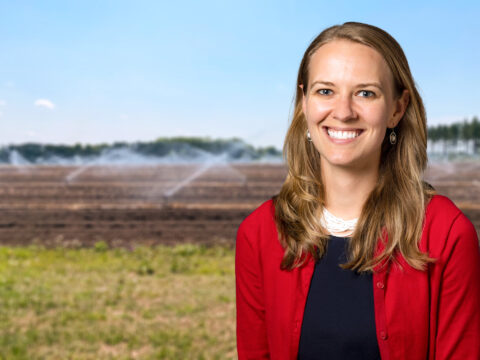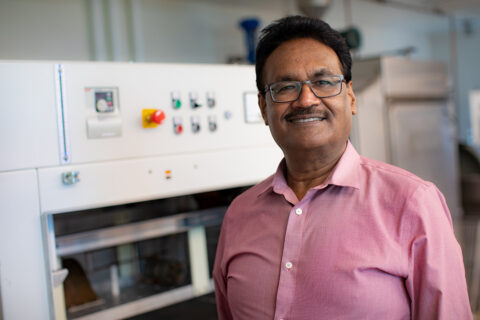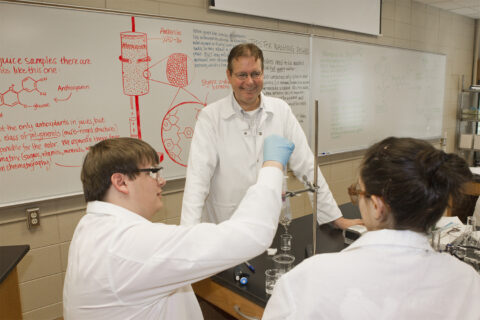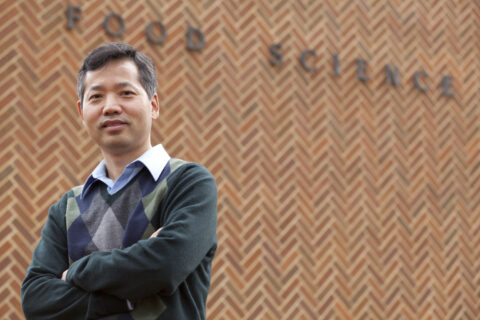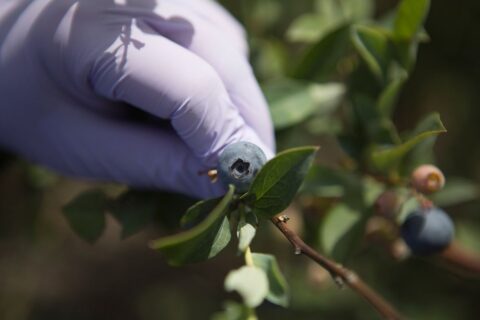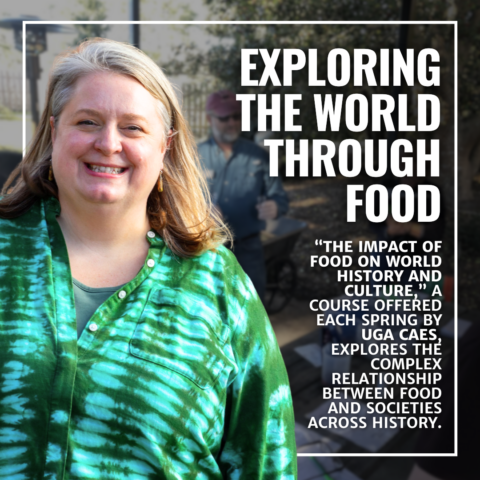Master of Food Technology
Master of Food Technology

I have always been passionate about teaching food science, especially when the focus is sensory analysis.
Professor
Overview
Offered online through the College of Agricultural and Environmental Sciences, the University of Georgia’s online Master of Food Technology will teach you how to maximize in-line processing efficiencies, improve food product quality and safety and implement good manufacturing practices in line with current regulations, food safety, and HAACP practices.
This fully online, non-thesis master’s provides working professionals the opportunity to learn from food industry experts and top food science and technology researchers. The Master of Food Technology degree offers the opportunity for instruction in core areas of food technology, such as processing, packaging, microbiology, fermentation, chemistry, ingredients, product development, and food regulation. In addition, the degree offers current and up-to-date information on emerging trends, new regulations, and potential innovations. You will learn identification and prevention of product failure, an understanding of the consumer mind and consumer needs, innovation in process optimization for consistent quality and safety, new product formulations to improve human health, and fermentation technology used in the beverage industry.
Whether your bachelor’s degree is in food science, chemistry, biology, nutrition, chemical engineering, environmental sciences, or other science-related fields, the Master of Food Technology will prepare you for a rewarding career in the food industry. Program graduates accept jobs such as Research & Development Director/Innovation, Manager of Quality Assurance, Quality Assurance Auditor, Executive R&D Chef, Senior Process Engineer, Manager of Ingredients, and Manager of Sales.
Accreditations
The University of Georgia is accredited by the Southern Association of Colleges and Schools Commission on Colleges (SACSCOC) to award baccalaureate, master’s, specialist, and doctoral degrees. The University of Georgia also may offer credentials such as certificates and diplomas at approved degree levels. Questions about the accreditation of the University of Georgia may be directed in writing to the Southern Association of Colleges and Schools Commission on Colleges at 1866 Southern Lane, Decatur, GA 30033-4097, by calling (404) 679-4500, or by using information available on SACSCOC’s website (www.sacscoc.org).
Admissions
Credit and Transfer
Total Hours Required to Earn Degree: 33 (credit hours)
Maximum Hours Transferable into Program: 6
Master of Food Technology Degree Program Admission Requirements
Students applying to The University of Georgia must be accepted by the Graduate School. Persons holding a bachelor’s degree from any institution accredited by the proper regional accrediting association are eligible to apply for admission to the Graduate School.
Two years of work experience in the food industry or food-related occupation in the public sector is recommended for admission to this graduate program.
Master of Food Technology Application Checklist
- Application – Submit the Graduate School Admissions online. Application fee: $75.
- Select Campus – Online
- Select Intended Program – MFT, Food Technology (Food Science and Technology) [MFT_FTEC_ONL]
- Résumé or curriculum vita – Submit online to the Graduate School.
- Statement of Purpose – Submit a one-two page statement of purpose online to the Graduate School. The statement of intent should clarify the candidate’s relevant background, interests, and goals in relation to the program.
- Transcripts – Submit unofficial transcripts from all institutions attended as part of the online application. Send official transcripts after you are offered admission.
- Letters of Recommendation – Submit three letters of recommendation online to graduate school. Letters should be from individuals who can evaluate the applicant’s scholarly ability and potential for success in a graduate program. Preferably at least two of them are from faculty who have instructed the applicant in a previous program of study. The application will prompt your recommenders to submit their letters electronically.
Application Deadlines
Domestic Applicants
- Fall: July 1 – While applications received prior to April 1 receive priority consideration, the program will review all competitive applications received before July 1.
- Spring: November 15
- Summer: May 1
International Applicants
- Fall: April 15
- Spring: October 15
- Summer: February 15
- International Applicants – must submit TOEFL or IELTS scores.
Cost
Master of Food Technology Tuition & Fees
Tuition rates and student fees may change each year.
Based on the 2024-25 credit-hour cost, a person who had completed this program at the recommended pace would have paid $21,285 in tuition. Reference this sheet to identify the current credit hour rate for your program of interest.
Please use the Estimated Cost Calculator on the Bursar’s Office website to calculate one academic (Fall/Spring) year’s tuition.
This program is an E-Rate program, so choose “yes” for the E-Rate line item within the calculator.
Fees for those students enrolled in exclusively online programs are $422 per semester.
Potential additional costs include:
- Textbooks
- Exam proctoring fees
- Technology upgrades
The complete cost of attendance can be found at https://osfa.uga.edu/costs/.
Financial Aid
Visit the Office of Student Financial Aid for information about financial assistance.
Corporate Assistance
Consult your employer about the availability of tuition reimbursement or tuition assistance programs.
Military Assistance
Active-duty military, veterans, and military families should visit Veterans Educational Benefits to take full advantage of available financial assistance and educational benefits.
University System of Georgia Tuition Assistance Program (TAP)
The purpose of TAP is to foster the professional growth and development of eligible employees. For more information, see Tuition Assistance (refer to the Distance Learning section).
Technology Requirements
- Computer with current operating system (Windows, Mac, or Linux). Additional peripherals such as webcam, headphones, and microphone are required.
- High-speed internet access.
Curriculum
Master of Food Technology Degree Program Structure
The Master of Food Technology degree program is fully online and consists of at least 33 semester hours. A student working full-time can complete the program in 2.5 – 3 years depending on the number of courses taken per semester. An advisor and graduate committee will work with you to design a program of study that meets your professional needs.
The exit project exposes students to comprehensive literature research and provides training in problem-solving and exhaustive analysis of a current topic in food science. At the end of the course work and exit project, students in the non-thesis master’s program will take a comprehensive final written and oral exam developed by the advisor and a graduate committee. Entrance requirements are the same as those for the Master of Food Technology degree. This is a professional degree program and will not meet the criteria for admission to the Ph.D. program in Food Science and Technology.
Master of Food Technology Area Courses and Electives
33 Semester Hours Required (6 hours required, 12 hours from Area courses, plus 15 hours of elective courses)
| Required Courses FDST 7007E – Directed Project in Food Science (3 sem hrs) FDST 7020E – Integration of Multidisciplinary Topics in Foods (3 sem hrs) |
|---|
| Area Courses |
| Processing (Select 1 course) FDST 7010E – Food Formulation and Preservation (3 hours) FDST 7080E – Contemporary Advances and Issues in Food Packaging Technology (3 sem hrs) FDST 7130E – Shelf Life of Packaged Foods and Beverages (3 sem hrs) |
| Microbiology (Select 1 course) FDST 7060E – Microbial Hazards in Food: Assessment and Control (3 sem hrs) FDST 7110E – Food Safety Programs (3 sem hrs) FDST 7120E – Food Fermentation Technology (3 sem hrs) |
| Chemistry (Select 1 course) FDST 7030E – Food Biochemical Reactions (3 sem hrs) FDST 7070E – Functional Foods (3 sem hrs) FDST 7150E – Food Ingredients and Function (3 sem hrs) |
| Product Development, Food Regulation (Select 1 course) FDST 7100E – Culinary Essentials for the Food Scientist and Technologist (3 sem hrs) FDST 7140E – Food Regulation and Policy (3 sem hrs) FDST 7160E – Sensory Analysis for Food Professionals (3 sem hrs) FDST 7180E – Marketing of Value-Added Foods (3 sem hrs) FDST 7250E – Food Product Development (3 sem hrs) |
| Electives (Select 5 courses) Select from any courses in either Processing, Microbiology, Chemistry, Product Development, Food Regulation areas. |
Faculty
News & Events
Fanbin Kong expands global research connections through AgINSPIRE
September 30, 2025For faculty like Fanbin Kong, professor in the Department of Food Science and Technology's online Master of Food Technology program, and Gaelen Burke, professor in the Department of Entomology, AgINSPIRE opened the door to new collaborations, research directions and student opportunities.
CAES Food Scientist Faith Critzer Explores Essential Oil Coatings for Organic Produce
January 15, 2025Faith Critzer, a professor in UGA’s Department of Food Science and Technology and a faculty member in the online Master of Food Technology program, is part of a team studying essential oil coatings to improve the safety and shelf life of organic produce. Organic fruits and vegetables face higher risks of spoilage and contamination due to the strict restrictions on chemical additives in organic farming.
Faith Critzer & Ronald Pegg Guide Students Through the Impact of Food on World History and Culture
August 12, 2024From the agricultural revolution to globalization, food has always held a defining role for humanity, with foodways serving as the foundation of many cultures and civilizations throughout history. “The Impact of Food on World History and Culture,” a course offered each spring by the UGA College of Agricultural and…
Testimonials
“I was excited to be among a network of peers who were similarly interested in this niche world of learning about how food is made and how to make it better. I knew that was something I wanted to be a part of. The reputation of UGA has opened so many doors for me, led me to meet incredible friends during college, and allowed me to connect with our alumni networks far and wide.”
Zane Tackett, ’20
“When I meet with customers I now have a broader understanding of how they are processing their products which helps me to ask better questions, so I can understand the issues they are facing and I am able to make suggestions to improve their product or save them money. The online Master of Food Technology degree made me a more valuable employee to the company I work for and opened doors for more advancements in my career.”
David Gill,’ 20
“The professors in the Food Technology program were highly knowledgeable with impressive credentials and they were very accessible.”
Paul Rockwell,’11
Contact Information
Contact us using the request for information form or call 706-480-8438.

